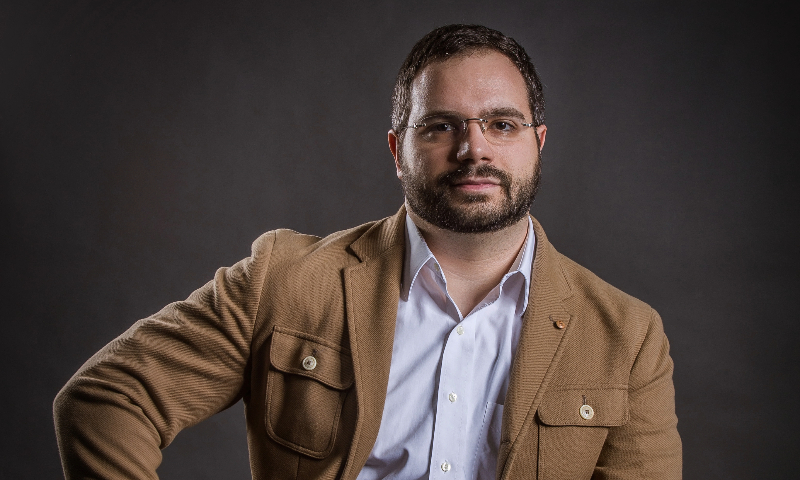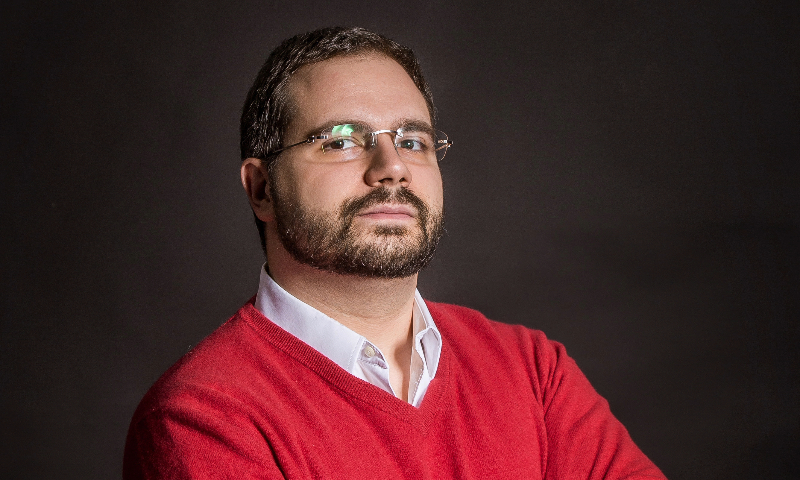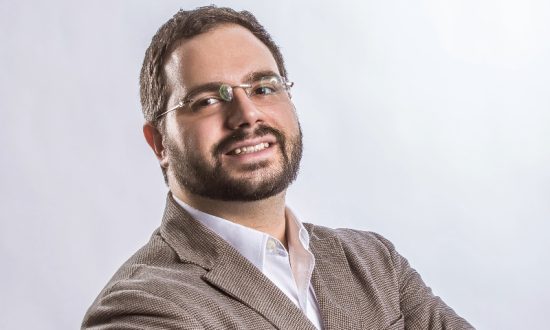Djuradj Caranovic is a behavioralist and AI enthusiast who combines neuroscience, psychology, and business strategy with AI to create transformative experiences. As a change manager and executive coach, he helps organizations design inspiring workflows fueled by human potential. Djuradj holds a PhD in economics and master’s in behavioral science, along with psychotherapy training. He has over 10 years of experience driving innovation, digital transformation, and growth for global companies. Djuradj is passionate about leveraging technology paired with human understanding to unlock creativity and meaning.
Recently, in an exclusive interview with Digital First Magazine, Djuradj shared his career trajectory, insights on how leaders can empower people to lead innovation and digital transformation within the organization, current roles and responsibilities at Fundus Consulting, his biggest stress reliever, words of wisdom, future plans, and much more. The following excerpts are taken from the interview.
Djuradj, please tell us about your background and areas of interest.
I have a diverse background spanning technology, business, and psychology. I’m fascinated by human potential and how we can empower people and organizations to thrive in an age of rapid change. My passion is discovering ways to help leaders embrace innovation while staying grounded in their values. Fun fact: I started my career in forensic accounting, co-authoring over 20 frameworks before making an unusual pivot into change management, executive coaching and mental health.
So, I made a pivot into executive coaching and mental health. It was an unusual transition, but my varied expertise allowed me to understand the human dynamics of change and the technological innovations driving it. Over the years, I’ve developed a strong interest in leveraging technology to drive business improvements and foster a culture of continuous innovation.
As VP of People, Strategy and Business Transformations, I transformed the company into a digital innovation leader. I worked with the executive team to develop and implement a new strategy, and I led the group through several successful change initiatives, including introducing new technologies, restructuring the organization, and creating a new culture of innovation.
I am also a certified psychotherapist, currently creating a modality of therapy that helps people heal and transform by connecting with their inner wisdom. This work is essential for leaders who want to make sustainable organizational change.
In your opinion, how can leaders empower people to lead innovation and digital transformation within the organization?
First and foremost, leaders need to model curiosity, humility and an openness to change. Employees are unlikely to take risks if their leadership doesn’t embody the spirit of innovation. Leaders should demonstrate that they too are life-long learners willing to embrace new ideas and unfamiliar technologies.
It’s also crucial that leaders create an environment built on trust and psychological safety. Employees should feel comfortable expressing ideas, asking questions and even challenging the status quo without fear of embarrassment or retribution. Leaders can encourage this by actively listening, avoiding top-down directives, and rewarding thoughtful failures as learning opportunities.
Additionally, leaders should focus on enabling self-direction and autonomy. The most transformative innovations often come from the bottom-up, not mandated from the top-down. Providing individuals and teams with the space and resources to direct their own projects fosters organic innovation.
Finally, leadership plays a key role in providing ongoing training, development opportunities and forums for cross-collaboration. Investing in people’s digital and creative skill-sets empowers them to become change-leaders. And connecting diverse groups across the organization breeds novel thinking.
To conclude my thoughts, leadership that models an innovative mindset, builds psychological safety, supports autonomy and facilitates skill-building and collaboration can unlock an organization’s full potential for transformational change. People are truly empowered when given both the permission and tools to drive progress.

With disruption and transformation being everywhere, what are the challenges you see facing your sector right now? How can we overcome those challenges?
The field of organizational change management faces immense disruption and transformation. The dizzying pace of technological advances, demographic shifts, and globalization have created significant uncertainty. Emerging technologies like AI are both a source of disruption and changes in business models and workflows.
However, this is an opportunity, not just a challenge. One key is to embrace agility and cultivate the ability to rapidly adapt. Change is constant – rather than resisting it, we must learn to pivot and evolve gracefully. I encourage experimenting with new methodologies like design thinking and lean startups that thrive in ambiguity.
Additionally, we need to tap into collective intelligence across silos and roles. Innovation often springs from unexpected places, so I frequently crowdsource ideas from interns to executives. Diversity of thought is crucial.
Staying intensely customer-centric is also vital to overcoming disruption. While the future is unpredictable, focusing on solving human needs tends to stand the test of time. I aim to deeply understand both employee and customer pain points and desires.
Finally, connecting on our shared humanity and purpose is essential. Change can be overwhelming, so I try to acknowledge people’s emotions while painting a compelling vision of the future. Transparent, empathetic communication and hands-on support help people feel understood and empowered to take the change journey together.
There are always challenges, but with adaptability, collective insight, customer-centricity and compassion, we can transform disruption into opportunity and continued relevance. Exciting innovations lie ahead.
Brief us about your roles and responsibilities as VP of People, Strategy and Business Transformations at Fundus Consulting.
As VP of People, Strategy and Business Transformations, I was responsible for aligning our talent, culture and capabilities to evolving business strategies and opportunities for growth.
A crucial part of my role was reimagining our performance management and professional development approaches to empower employees and nurture agility. I launched digital literacy programs to skill up our people, as well as formed strategic partnerships to access capabilities needed for our transformation.
But ultimately, my most important task was fostering an inclusive, trusting and empowering culture where every person could thrive and do their best work, even amidst disruption. I aimed to help our people grow on a human level, not just as workers.
One program I spearheaded ended up receiving national recognition as HR Best Practice of the Year for its inventive approach to talent mobility. But accolades aside, the most rewarding part of my job was helping unlock the potential of our team.
I transformed HR from a reactive administrative function into a forward-thinking architect of organizational change. Instead of mandated processes, I nurtured a peer-to-peer system of empowerment where every employee could act as a “chief human resources officer” shaping their own experience.
My proudest legacy is a culture where, rather than being change victims, our people are change leaders excited to drive our transformation. Our agility and human potential give me great confidence in our future.

Can you please tell us about Inner Pathways Therapy and its mission and vision?
Inner Pathways Therapy aims to transform mental healthcare through innovative digital platforms and a mission of accessible support for all.
Our vision is a world where seeking therapy is destigmatized and as commonplace as visiting a doctor. We believe everyone deserves the opportunity to improve their mental fitness and resilience.
To make this vision a reality, our digital platform replaces office visits with accessible anytime, anywhere therapy and coaching. We reach those in need by meeting them where they are – on their devices and in their daily lives.
A key milestone was surpassing 10,000 active users last month, demonstrating the demand for more available mental health services.
We judiciously use AI to augment human connection, not replace it. The technology allows us to scale empathetic support to meet growing needs. Our controversial view is that for mild-moderate cases, an empathetic AI coach can be as effective as human therapy.
At our core, Inner Pathways Therapy aims to help people understand themselves deeply, overcome obstacles, and live with intention. We are passionate about leveraging technology to break down barriers standing in the way of mental well-being. We envision and work toward a world where all who struggle have the tools to find inner wisdom and resilience.
What is anything you wish you knew when you first went into this career?
Looking back on my career, I wish I had known the importance of adaptability and resilience in the face of change. Change management and technology are both constantly evolving, and being able to adapt to new situations and challenges is essential. I’ve learned that staying open to learning and being agile in my approach has been instrumental in my success.
If I could people’s in time, I would tell myself to focus less on the technical aspects of change management and more on the people side. Change management is all about helping people to adapt to change, and that requires a deep understanding of human behavior and motivation.
I would also tell myself to be more patient. Change takes time, and it is important to be realistic about what can be achieved in the short term.
In your academic or work career, were there any mentors who have helped you grow along the way? What’s the best piece of advice you have ever received?
Early in my career, I had a manager who believed in me more than I believed in myself. She gave me stretch assignments that grew my confidence. Thanks to her encouragement, I found my voice as a leader. The best advice I ever received was: “Don’t wait until you feel 100% ready. Step up boldly and grow into your emerging self.” Life-changing moment: That advice led me to take a risk and accept an executive role that ultimately changed the whole trajectory of my career.
The 40-hour workweek is an outdated construct. To support creativity and family life, I offer flexible schedules, open vacation policies, and results-focused work environments. Let passion and intrinsic motivation drive activity, not rigid hours. Bold idea: Replace timesheets and attendance policies with self-set goals and consistently high contributions.
Throughout my career, I’ve had the privilege of working with some amazing mentors who have guided me. One of the best pieces of advice I received was to always prioritize empathy and active listening when leading teams. Understanding the needs and concerns of your team members and genuinely listening to their feedback can lead to better outcomes and a more engaged workforce.
I have been fortunate to have a number of mentors throughout my career. The best piece of advice I have ever received is to “always be learning.” The world is constantly changing, and staying up-to-date on the latest trends and developments in your field is important.
What is your biggest stress reliever?
For me, sailing is more than just a hobby – it’s a metaphor for how I try to live my life.
The voyage of sailing teaches me to chart a course but adapt when the winds and tides change. It reminds me that while I can’t control every variable, I can adjust my sails to steadily make progress.
Sailing requires resilience – when storms hit, staying calm and focused is vital. This mindset helps me weather all of life’s challenges.
And I love how sailing connects me to something bigger – the power of nature working in harmony. It grounds me in mindfulness and appreciation.
Most of all, sailing keeps my perspective balanced. When stress mounts, it reminds me that there is beauty, adventure, and calm out on the water. Maintaining time for these revitalizing experiences helps me not get caught up in the gusts and doldrums of work.
The lessons I learn while sailing – about resilience, mindfulness, and balance – steer me to greater fulfillment and purpose in all that I do. It may seem like an escape, but in fact, it’s a vital part of my journey.
You have been a recipient of prestigious awards and accolades throughout your career. What is the secret mantra behind your success?
I’m deeply grateful for the recognition I’ve received, like my award from Disney for child behavioral analysis. My motivation has always been finding purpose in driving change – whether through organizational change initiatives, data-driven transformations, digital transformation projects, or coaching leaders on managing challenges.
However, accolades only affirm that my integrative approach – blending professional experience, life wisdom, and psychology expertise with creativity – resonates.
My true motivation has always been finding purpose and fulfillment in positively impacting people through avenues like in-house training programs, the over 200 lectures I’ve given on self-development and my executive coaching practice.
Success to me is seeing my experience-based psychotherapy model help others heal. Or giving a lecture advocating for frameworks that empower authenticity, transforming it into actual value. My proudest achievements involve progress made individually and collectively.
Staying genuinely curious, collaborating widely, and acting with integrity have been fundamental. But it is the brilliance of my teammates that allows our shared vision to come to life. Fostering a culture of innovation and uplifting each other is how we embrace change courageously.
There is no secret mantra, only channeling our collective purpose to elevate human energy. My radical idea is assessing performance on living shared values versus status markers. I’m moved most by my team’s recognition of my commitment to human-centered service.
If my passion for integrating science, creativity, and expertise inspires others to find this synergy in their own pursuits, that is the ultimate honor. I’m endlessly grateful to collaborate with those who make magic happen.
What is your biggest goal? Where do you see yourself in 5 years from now?
My biggest professional goal is to drive impactful change as an innovation and transformation leader. In 5 years, I see myself guiding organizations globally on leveraging AI ethically to adapt intelligently. I aim to foster agile cultures that implement disruptive technologies like AI while staying grounded in purpose.
I also hope to have made strides in breaking down barriers in mental healthcare through initiatives like my book, “The Book That Changed Me,” which aims to destigmatize mental health. My dream is a future where mental well-being is fully supported without stigma.
Ultimately, I want to empower people across industries to adapt during this age of rapid change. By blending my expertise in organizational psychology, AI, and progressive mental healthcare, I believe we can humanize digital transformation.
On a personal level, I strive to never lose my curiosity and growth mindset. By remaining humble and open, I hope to bring compassion and wisdom to my work, uplifting individuals, teams, and systems to reach their full potential through AI innovation.
What is the one piece of advice that you can share with other professionals in the tech industry?
It’s tempting to conform and sanitize yourself to appear more professional as you build the next big thing. But embracing quirky passions is key to creating something truly groundbreaking and impactful.
Look at me – I’m a former financial expert turned mindfulness therapist who loves to dance Tango. By fusing my curiosities, I made neural networks accessible through interpretive dance. My obsessions make me nerdy but also fuel visionary innovation.
However, while being your unapologetically unique self, also stay grounded in ethics. Consider how each technology will influence people’s lives, prioritizing transparency, privacy, inclusivity, and accessibility. Seek diverse perspectives to avoid blindspots.
Just because you can build something, doesn’t always mean you should. Allow human compassion to guide your creativity. By advancing technology through an ethical lens, we can elevate the human experience rather than let ambition outpace conscience.
So be proudly odd AND guided by moral purpose. When we combine individuality with integrity, the tech industry can change the world for the better.
The people who change the world don’t conform to fit in. They change the world by thinking differently. So, cultivate and celebrate what makes you weird. It’s what will make you wonderful.






